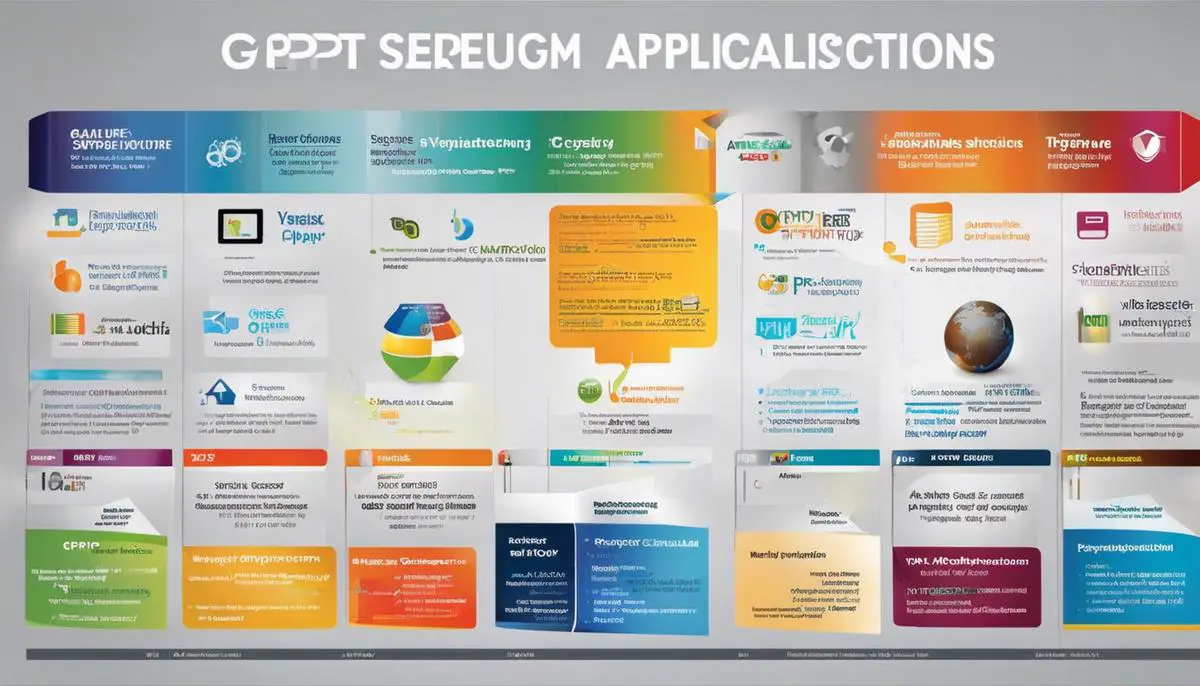The digital age has ushered in a new era of technological wonders, with the GPT (Generative Pretrained Transformer) Store standing at the forefront of this revolution. From sophisticated tools that push the boundaries of academic research to lifestyle GPTs that effortlessly blend into our daily routine, the store’s offerings are nothing short of transformative. As we peel back the layers of the GPT Store’s extensive inventory, we find a world where artificial intelligence not only complements but elevates human capabilities. This essay will explore the wide array of applications housed within the virtual shelves of the GPT Store, highlighting the seamless integration they offer for both professional and personal spheres, and underscoring the groundbreaking tools that are redefining efficiency, accuracy, and creativity in our lives.
Overview of GPT Store’s Offerings
Table of Contents
Your Gateway to Next-Level AI: Exploring the GPT Store’s Diverse Apps
In a tech landscape that’s constantly evolving, the General Purpose Transformer (GPT) Store is a game-changer, offering a treasure trove of applications that cater to various needs and sectors. From unleashing creativity to streamlining business processes, the GPT Store is not just a repository – it’s a powerhouse of innovation.
First off, for those who thrive on creativity, GPT apps in content generation are miraculous. Writers suffering from writer’s block? Say no more. These applications can generate articles, poetry, or even scripts, all at the click of a button. They refine raw ideas into elegant prose, infusing a burst of inspiration where it’s most needed.
Next up, language learning tools. These are not your average textbook companions; they’re interactive and adaptive, personalizing the learning experience for optimal results. Whether polishing an accent or mastering grammar, these apps are like having a personal tutor in your pocket.
Now, let’s talk business efficiency. With the GPT scheduling assistants available, forget the back-and-forth email chains to set up meetings. These apps analyze calendars, suggest time slots, and even send out invites, virtually eliminating the hassle of appointment setting.
There’s a goldmine for developers as well. Code generation apps take the concept of pair programming to another level, offering code suggestions and spotting potential bugs. It’s like having an AI colleague who’s never tired and always ready to assist.
On the customer service side, GPT store’s virtual assistants are revolutionizing the field. Capable of understanding and responding to queries in a human-like manner, these apps reduce wait times and improve the overall customer experience.
Education is not left behind either. Tailored tutoring programs harness GPT’s capabilities to provide students with personalized feedback and learning paths, making education more accessible and effective.
And for the analytical minds out there, data analysis applications transform raw numbers into insights and forecasts. They’re a boon for those looking to make data-driven decisions without getting bogged down in spreadsheets.
In essence, the GPT store is your one-stop shop to elevate personal and professional life through AI. The diversity of applications available speaks volumes about the potential AI has to not just enhance but also revolutionize the way tasks are approached across various domains. It’s about time to dive in and transform the mundane into the extraordinary.

Impact on Academic Research
The Role of GPT Services in Revolutionizing Academic Research
In the realm of academic research, upending traditional methodologies often signifies progress. Enter Generative Pre-trained Transformer (GPT) services, the futuristic toolkits that are not just reshaping, but reconstructing the entire research landscape with their innovative prowess.
Say goodbye to the days when deep dives into texts were solely human endeavors. GPT services, with their machine learning chops, navigate vast oceans of digital libraries to fish out pertinent information at speeds that put manual search to shame. They are not simply search engines but learned scholars, programmed to understand context and nuance. This ability allows researchers to refine their studies with laser precision, carving out chunks of highly relevant data from the monolithic data blocks of academia.
Consider the art of hypothesis testing. GPT services transform this often-tedious task into a streamlined process. By rapidly simulating numerous scenarios and analyzing countless variables, they provide researchers with a buffet of probable outcomes. This not only saves precious time but also enables scholars to conduct more complex experiments that were once restricted by human limitations.
Furthermore, GPT services are now cornerstone tools in literature review—arguably the most daunting part of any research. They skim through paper after paper, digest comprehensive topics, and present summations that once took days, if not weeks, in mere hours. This boosts efficiency, allowing researchers to spend more time on their actual experiments and analysis.
GPT services also democratize research. Small institutions or independent researchers without the luxury of large teams or big budgets can now compete on a more level playing field. They offer DIY analytics that can generate graphs, charts, and statistical data which, until now, required specialized knowledge and software.
Lastl+y, have you considered the power of collaboration? GPT services are facilitating international cooperation in ways not seen before. Bridging language barriers, they help in the synthesis of multi-lingual research, ensuring that valuable insights are not lost in translation.
In the end, GPT services are more than tools; they are ever-evolving companions to academic researchers. Scholars who embrace them find themselves riding the crest of a wave that is as exciting as it is monumental in the quest for knowledge. And in this technologically-empowered age, where anything less than swift adaptation is akin to academic inertia, the fusion of GPT services into research methodologies is not just smart; it’s absolutely essential for the forward-thrusting researcher.

Photo by impatrickt on Unsplash
Lifestyle GPTs in Daily Use
Unlocking Efficiency: The Rising Impact of Generative AI on Personal Productivity and Leisure
In a world brimming with information overload, the quest to manage one’s personal productivity and leisure might seem Sisyphean. Generative Pre-trained Transformers (GPTs) step into this breach as powerful allies, morphing from novel tech novelties to vital tools that streamline our activities and enrich the way we relax and work.
Diving into academia, we encounter an expansive ecosystem where time is a scarce commodity. Scholars are tasked with navigating this jungle of knowledge, a feat that’s becoming exponentially more manageable, thanks to GPT services. These advanced AI programs are akin to having a digital research assistant, deftly sorting through masses of data and literature with a swiftness and accuracy no human can match. This accelerates the pace at which researchers can uncover relevant studies, assess their significance, and incorporate them into their own work.
The scientific method hinges on the formulation, testing, and refining of hypotheses – a process now supercharged by GPT services. These AI platforms serve as virtual testing grounds, simulating a range of outcomes that help academics forecast the viability of their propositions. From climate models to market trends, GPTs are turning hypothetical conjectures into tangible predictions without the need for resource-heavy experiments.
Literature reviews have long been the bane of the academic process, demanding exhaustive reading and analysis. GPTs have the capability to distill countless pages of text, extracting key points and providing concise summaries. This not only saves researchers invaluable time but also broadens their frame of reference, potentially sparking innovative ideas and approaches.
The democratization of research is one of the most profound effects brought about by GPT services. Once the exclusive domain of specialized experts, complex data analysis and interpretation now sit within reach of those with the drive to explore and understand. GPTs lend themselves to DIY enthusiasts, small businesses, and curious minds, serving up analytics and actionable insights without the steep learning curves traditionally associated with data science.
Furthermore, GPT services are breaking down language barriers, facilitating unprecedented levels of international cooperation. By synthesizing multilingual research, these AI tools enable seamless collaborations across borders, pooling global expertise in ways that were once logistically impossible. This is not just productivity-enhancement; it’s a paradigm shift in how knowledge is shared and synthesized.
As GPT services evolve, their role as academic companions deepens – fostering a symbiosis between human and machine intelligence. Scholars and students alike must adapt, embracing these AI partners to stay on the bleeding edge of productivity and innovation. GPTs are not a threat to the traditional quest for knowledge; they are accelerants, pushing the boundaries of what’s possible in both academic research and leisurely pursuits.
The bottom line is that lifestyle GPTs are revolutionizing the way we handle information-intensive tasks, letting us reclaim time for creativity, relaxation, and the human touch that technology can’t replace. With each passing day, these services move us closer to an optimized balance of work and play, proving that the future of personal productivity is already at our fingertips.

Future Prospects of GPT Technologies
Anticipated Advances in GPT Technology Beyond Everyday Applications
As Generative Pre-trained Transformer (GPT) services continue to evolve, their impact transcends routine tasks and ventures into the heart of academic research. One can expect these AI-driven platforms to significantly boost researchers’ ability to navigate expansive databases with remarkable precision. By leveraging GPT technology, upcoming applications will offer profound insights by quickly trawling through endless rows of scholarly articles, enabling academics to identify relevant studies with an efficiency previously unattainable.
In the arena of scientific inquiry, hypothesis generation and testing are foundational elements. GPT advancements are paving the way for AI to partake in this process, simulating numerous scenarios based on variable inputs. Researchers will be empowered to run virtual experiments, extrapolate data, and visualize outcomes within seconds – a task that would normally consume extensive manhours.
Literature reviews, a critical element in scholarly studies, can be onerous, demanding significant time and effort. Future GPT systems are anticipated to refine their summarization capabilities further. Imagine a tool that not only absorbs vast topics but also delivers an executive summary that encapsulates all key findings and arguments concisely. This invaluable tool will aid researchers in both conducting and composing comprehensive literature reviews.
The potential of GPT platforms extends to democratizing research. Advanced DIY analytics and data generation tools will soon be within the reach of the average user. This shift will open doors to those without formal training in data science or statistical analysis, allowing for a surge in independent research and innovation. Aided by GPT, complex data interpretation becomes accessible to all, consequently expanding the world’s research community.
Moreover, as our society becomes increasingly globalized, international cooperation is key. Future GPT services will be instrumental in amalgamating multi-lingual research, facilitating a seamless synthesis of global knowledge. This consolidation of expertise across language barriers enriches academic discourse and contributes to a more interconnected scholarly environment.
Finally, the evolution of GPT technology foresees these services becoming increasingly collaborative, acting as indispensable companions to academic researchers. Their role demands a dynamic adaptation, mirroring the ever-expanding quest for knowledge. These tools will need to work alongside human intellect, offering cognitive support, enhancing creative thought processes, and unleashing a higher cerebral potential within research communities.
In a nutshell, the future of GPT in academia is not just promising; it’s revolutionary. Anticipate a landscape where the synthesis of information, analytical prowess, and cooperation transcend limits, driving the sphere of academic research into new realms of efficiency and global integration. The tools that once seemed auxiliary are on the cusp of becoming essential, shaping a tomorrow where AI and human intellect converge to accelerate human progress.

As we stand on the cusp of what may be the greatest era of AI integration in human history, GPT technologies stretch the canvas of possibility, painting a future rich with potential. The fusion of AI with our daily endeavors, from the depths of academic research to the simplicity of lifestyle convenience, is not just reshaping our current landscape but is also drawing a map to uncharted territories. With every new algorithm, feature, and application, GPT technologies are steadily crafting a world where the line between human endeavor and machine efficiency becomes beautifully blurred. The societal tapestry we’re weaving with these tools will be deeply embossed with the marks of innovation, ethics, and the continual pursuit of balance between human touch and the precision of AI.

I’m Dave, a passionate advocate and follower of all things AI. I am captivated by the marvels of artificial intelligence and how it continues to revolutionize our world every single day.
My fascination extends across the entire AI spectrum, but I have a special place in my heart for AgentGPT and AutoGPT. I am consistently amazed by the power and versatility of these tools, and I believe they hold the key to transforming how we interact with information and each other.
As I continue my journey in the vast world of AI, I look forward to exploring the ever-evolving capabilities of these technologies and sharing my insights and learnings with all of you. So let’s dive deep into the realm of AI together, and discover the limitless possibilities it offers!
Interests: Artificial Intelligence, AgentGPT, AutoGPT, Machine Learning, Natural Language Processing, Deep Learning, Conversational AI.





